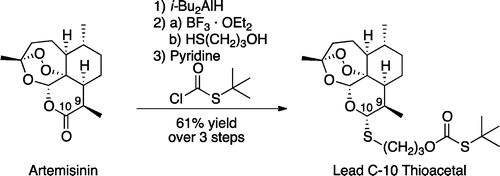New malaria drug requires just one dose and appears twice as effective as existing regimen

Scientists are reporting development of a new malaria drug that, in laboratory tests, has been twice as effective as the best current medicine against this global scourge and may fight off the disease with one dose, instead of the multiple doses that people often fail to take. A report on the drug appears in ACS' Journal of Medicinal Chemistry.
Gary Posner and colleagues explain that malaria continues to kill almost 1 million people annually. The best existing treatment is so-called artemisinin combination therapy (ACT). It requires patients to take pills every day for several days, and many patients fail to complete the regimen. As a result, these patients don't get better, and it opens the door for malaria parasites to develop resistance to ACT. To stop that from happening, the researchers developed a new type of ACT that could stop malaria in a single dose.
They describe a series of new compounds they developed that, given once, are more effective than traditional artemisinin-derived substances. One of the new compounds, when combined with mefloquine, killed off all of the parasites in some mice with just a single oral dose and allowed those mice to live almost twice as long as those treated with conventional ACT.
More information: "Malaria-Infected Mice Live Until at Least Day 30 after a New Artemisinin-Derived Thioacetal Thiocarbonate Combined with Mefloquine Are Administered Together in a Single, Low, Oral Dose", J. Med. Chem., 2012, 55 (17), pp 7892–7899. DOI: 10.1021/jm3009986
Abstract
In only three steps and in 21–67% overall yields from the natural trioxane artemisinin, a series of 21 new trioxane C-10 thioacetals was prepared. Upon receiving a single oral dose of only 6 mg/kg of the monomeric trioxane 12c combined with 18 mg/kg of mefloquine hydrochloride, Plasmodium berghei-infected mice survived on average 29.8 days after infection. Two of the four mice in this group had no parasites detectable in their blood on day 30 after infection, and they behaved normally and appeared healthy. One of the mice had 11% blood parasitemia on day 30, and one mouse in this group died on day 29. Of high medicinal importance, the efficacy of this ACT chemotherapy is much better than (almost double) the efficacy under the same conditions using as a positive control the popular trioxane drug artemether plus mefloquine hydrochloride (average survival time of only 16.5 days).
















